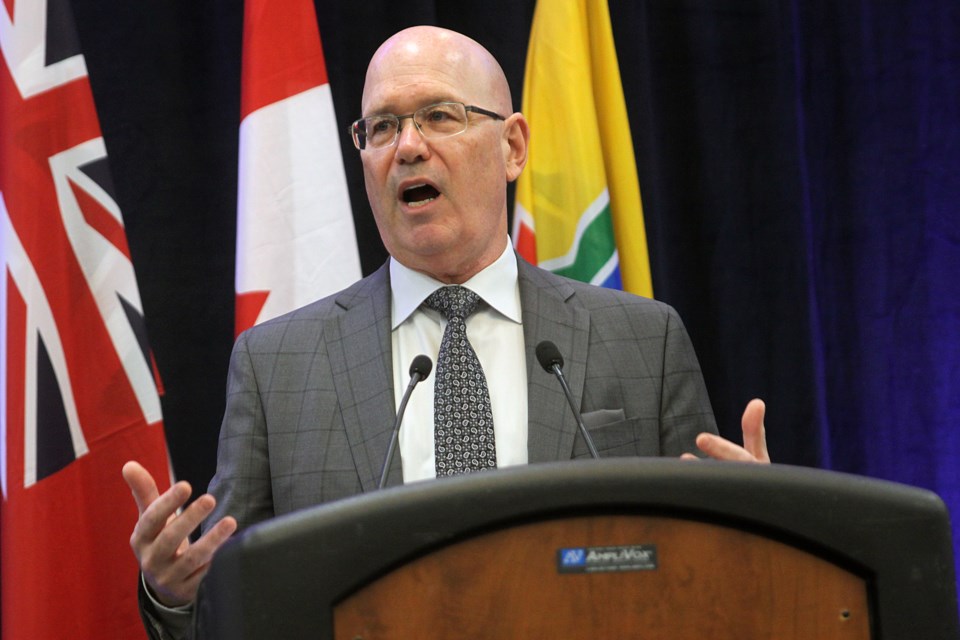EDITOR’S NOTE: This article originally appeared on The Trillium, a new Village Media website devoted to covering provincial politics at Queen’s Park.
Mississauga, Brampton and Caledon will be Peeled apart in under two years — and six other regions have been put on notice that they could be next.
The Tories introduced legislation on Thursday dubbed the "Hazel McCallion Act" to dissolve Peel Region and have the three municipalities stand on their own starting Jan. 1, 2025.
Municipal Affairs and Housing Minister Steve Clark said he was taking "decisive action" to help the municipalities build more homes.
Ontario also said it will appoint "regional facilitators" in the coming weeks for the upper-tier municipalities of Durham, Halton, Niagara, Simcoe, Waterloo and York. Their job will be to find out whether the municipalities that make up those regions are able to stand on their own.
The facilitators were initially announced in November with the goal of looking into whether the regions should get strong mayor powers, and to advise on "the best mix of roles and responsibilities between upper and lower-tier municipalities" for tackling the housing crisis.
Simcoe, which was initially left off the list, was added on Thursday.
Now, the government is explicitly saying the D-word.
"These facilitators will be tasked with reviewing whether the upper-tier government continues to be relevant to the needs of its communities or whether the lower-tier municipalities are mature enough to pursue dissolution," reads the Thursday release.
It's still unclear who the facilitators will be.
"Details regarding the facilitators and the timing of their appointment are under development and we will have more to share on that soon," Ministry of Municipal Affairs and Housing (MMAH) spokesperson Melissa Diakoumeas said in an email.
None of the municipalities provided comment about their potential dissolution by press time.
There's nothing in the new legislation about expanding any municipal boundaries, as the government has been wont to do, sometimes without warning. Of course, the facilitators could make that recommendation; or the government could decide to do it at any time.
Clark was asked on Thursday why Simcoe was added to the list.
"I think we've always had that discussion, given the high growth pressures in Simcoe County," he said. "Servicing is obviously an issue."
An up-to-five-person transition board will oversee Peel Region's breakup. The panel will make recommendations to the Ford government about the slew of issues that will have to be sorted out — like the future of municipal taxes, finances, regional staff, conservation authorities, and the Peel Region Police — by 2025.
The board will also have the power to ban the municipalities from doing things it deems would hurt the dissolution. If the municipalities ignore the board, the legislation gives power to Clark to step in and manage their affairs directly.
The government said it expects all local services to continue as normal during the transition.
The Ford government will appoint the panel's members sometime this year — and the municipalities will foot the bill, according to the legislation.
It's unclear what qualifications board members will need to have, if any, but MMAH staff said they'll have financial, labour and government expertise.
Clark said the complexity of the job means the board members won't be simple patronage appointments.
The government wants to hear the transition board's recommendations by the summer or fall of next year. It plans to introduce a second bill to address any issues that come up in that time.
The Ford government also recently appointed auditors for Peel Region and the three municipalities, as well as Toronto and Newmarket.
That's a separate process that has to do with the PCs' recent housing bill and determining how a provincially mandated cut to development will affect their finances, but the audits will be used to inform the dissolution process, MMAH staff said in a technical briefing.
Clark said he doesn't believe the expanded scope of the audits will slow them down.
The split will kick off a potentially messy dispute between two powerful GTA cities.
Mississauga Mayor Bonnie Crombie is all for the split, saying last week that her city pays over 70 per cent of Peel Region's costs, "plus transferring up to $84 million a year to Brampton."
Brampton Mayor Patrick Brown has promised to sue Mississauga if it doesn't give his city $1–2 billion in restitution, noting that Brampton paid for a significant chunk of Peel's water treatment facilities and the Peel Regional Police HQ in Mississauga.
"I'm grateful the premier says — and said very unequivocally — that we'll be made whole," he said, standing beside Crombie and Clark on Thursday. "And I appreciate his reassurance to us because it would be catastrophic for property taxes if that wasn't the case."
Crombie said she's "only asked for fairness and equity in this process."
"But certainly, I'm delighted that the minister will be making us all whole," she said. "Perhaps it's Mississauga that will be needed to be made whole for the contributions that we have made over the past 50 years during the growth phase of Brampton and Caledon."
Premier Doug Ford has walked a fine line recently, agreeing with Brown "100 per cent" that Brampton needs to be made whole — but appearing alongside Crombie a few days later saying he wants the "best services" for Mississaugans.
Caledon Mayor Annette Groves was also at the announcement, standing to the side while Crombie and Brown politely bickered.
"We're the child in this marriage," she said to laughter from the gathered reporters and politicos. "And children get to speak in a divorce, because at the end of the day, they children, they are affected."
Caledon didn't want this split, but she has faith that the Ford government will see things done fairly — she's managed to, she said.
"I had a great divorce," she said. "My ex-husband comes in, lets my dog out and takes my garbage out. What more can you ask for?"



